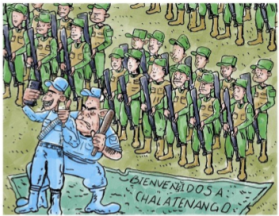Salvadoran reconstruction following torrential rains estimated at $1.5 billion
El Salvador has had blue skies since Thursday, October 20, after 10 days of non-stop rains devastated the country, dumping more than annual rainfall on the country. President Mauricio Funes considers this "the greatest natural disaster the country has faced in recent history". The United Nations estimates that $1 billion will be needed for the reconstruction process, while Funes estimates $1.5 billion. In context, El Salvador’s annual budget is a little over $4.2 billion. This storm generated more than double the rainfall of Hurricane Mitch which caused 240 deaths in 1998 and over three times the rainfall of Hurricanes Stan and Ida, which caused 72 deaths in 2005 and 124 deaths in 2009. A timely and comprehensive government response effectively evacuated over 60,000 people, limiting the loss of life to just 34 casualties. However, many people saved by rapid evacuation have lost their homes. More than 30,000 people remain in shelters, where the Ministry of Health is providing 24 hour medical services and providing psychological services for the families. While the loss of life was reduced, the damage to infrastructure and crops has been worse. Most mudslides on major roadways have been cleared, but 37 bridges were damaged or collapsed. The Ministry of Agriculture reports that over 80,000 tons of bean and grain harvests were lost, affecting at least 270,000 small-scale farmers. Despite the heavy crop losses, the Ministry of Agriculture reports that the total agricultural yield for the year will still be higher than last year, due to this year's increased seed distribution to farmers and more abundant harvests from earlier this year. Food prices are beginning to rise as a result of the perceived food scarcity and the FMLN has proposed a legislative decree to freeze grain prices for the next six months to ensure that food remains affordable. Thousands of Salvadorans across the country have turned out to volunteer in shelters, donate goods and clean up devastated communities. The Farabundo Martí National Liberation Front (FMLN) party has called upon its members to support relief and reconstruction, and has organized weekend work brigades - it is the only party to mobilize its base in the aftermath of the rains. Non-profit and social movement organizations have responded similarly. On Tuesday, October 25, President Funes convened an emergency meeting of the Central American Integration System (SICA) to assess regional damage and coordinate reconstruction efforts. SICA dignitaries agreed that El Salvador had been the hardest hit by the disaster and that the precarious infrastructure and living conditions in Central America must be addressed to prevent future devastation on this scale. The SICA countries planned to convene an advisory board of allied representatives of organizations and governments they have close relationships with to begin the process of searching out aid and financing for the long and expensive reconstruction process. Although the Funes administration and UN have issued a call for international aid, the fact that a "tropical depression" rather than an official hurricane or storm caused such damage has resulted in less international attention on the disaster, and also less aid. The government requested disbursement of a special World Bank loan that was previously negotiated and on hand for an emergency like this. The devastation experienced in El Salvador, as analysts point out, is the result of a social crisis, rather than simply a natural disaster. Past government’s policies of cutting corners in bridge and road construction, the lack of safe housing and adequate management of where people settle into communities and massive discharges from the hydroelectric dams that dot the country are the real causes of so much devastation and the reason El Salvador is considered one of the most vulnerable countries in the world. While improvements in the early evacuation response made by the Funes administration saved many lives, policies and practices to address those real causes will be necessary to avoid devastation like this in the future. Funes has said the reconstruction process will be used as an opportunity to address these issues.

 "I am a CISPES supporter because continuing to fight for social justice and a more people-centered country means continuing the dream and sacrifice of thousands of my fellow Salvadorans who died for that vision.” - Padre Carlos, New York City
"I am a CISPES supporter because continuing to fight for social justice and a more people-centered country means continuing the dream and sacrifice of thousands of my fellow Salvadorans who died for that vision.” - Padre Carlos, New York City

